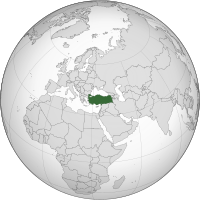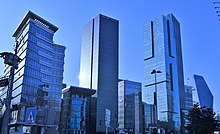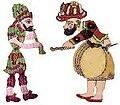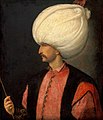Portal:Turkey
Merhaba! Türkiye portalına hoşgeldiniz. Hi! Welcome to the Turkey portal.
 | |

| |
Turkey, officially the Republic of Türkiye, is a country mainly in Anatolia in West Asia, with a smaller part called East Thrace in Southeast Europe. It borders the Black Sea to the north; Georgia, Armenia, Azerbaijan, and Iran to the east; Iraq, Syria, and the Mediterranean Sea (and Cyprus) to the south; and the Aegean Sea, Greece, and Bulgaria to the west. Turkey is home to over 85 million people; most are ethnic Turks, while ethnic Kurds are the largest ethnic minority. Officially a secular state, Turkey has a Muslim-majority population. Ankara is Turkey's capital and second-largest city; Istanbul is its largest city, and its economic and financial center, as well as the largest city in Europe. Other major cities include İzmir, Bursa, Antalya, Konya and Adana.
Human habitation began in the Late Paleolithic. Home to important Neolithic sites like Göbekli Tepe and some of the earliest farming areas, present-day Turkey was inhabited by various ancient peoples. Hattians were assimilated by the incoming Anatolian peoples. Increasing diversity during Classical Anatolia transitioned into cultural Hellenization following the conquests of Alexander the Great; Hellenization continued during the Roman and Byzantine eras. The Seljuk Turks began migrating into Anatolia in the 11th century, starting the Turkification process. The Seljuk Sultanate of Rum ruled Anatolia until the Mongol invasion in 1243, when it disintegrated into Turkish principalities. Beginning in 1299, the Ottomans united the principalities and expanded; Mehmed II conquered Istanbul in 1453. During the reigns of Selim I and Suleiman the Magnificent, the Ottoman Empire became a global power. From the late 18th century onwards, the empire's power and territory declined; reforms were also made.
In the 19th and early 20th centuries, persecution of Muslims during the Ottoman contraction and in the Russian Empire resulted in large-scale loss of life and mass migration into modern-day Turkey from the Balkans, Caucasus, and Crimea. Under the control of Three Pashas following a coup, the Ottoman Empire entered World War I in 1914. During the war, the Ottoman government committed genocides against its Armenian, Greek and Assyrian subjects. After its defeat, the Ottoman Empire was partitioned. The Turkish War of Independence resulted in the abolition of the sultanate in 1922 and the signing of the Treaty of Lausanne in 1923. The Republic was proclaimed on 29 October 1923, modelled on the reforms initiated by the country's first president, Mustafa Kemal Atatürk. Turkey remained neutral during most of World War II, but was involved in the Korean war. Coups in 1960 and 1980 interrupted the transition to a multi-party system.
Turkey is an upper-middle-income and emerging country; its economy is the 17th- or 11th-largest in the world. It is a unitary presidential republic. Turkey is a founding member of the OECD, G20, and Organization of Turkic States. With a geopolitically significant location, Turkey is a regional power and an early member of NATO. An EU-candidate, Turkey is part of the EU Customs Union, CoE, OIC, and TURKSOY. Turkey has coastal plains, a high central plateau, and various mountain ranges; its climate is temperate with harsher conditions in the interior. Home to three biodiversity hotspots, Turkey is prone to frequent earthquakes and is highly vulnerable to climate change. Turkey has universal healthcare, growing access to education, and increasing innovativeness. It has 21 UNESCO World Heritage sites, 30 UNESCO intangible cultural heritage inscriptions, and a rich and diverse cuisine. Turkey is a leading TV content exporter and is the fourth most visited country in the world. (Full article...)
Selected article -
Turkey is a founding member of the OECD and G20. The country's economy ranked as the 18th-largest in the world and 7th-largest in Europe by nominal GDP in 2023. It also ranked as the 11th-largest in the world and 5th-largest in Europe by PPP in 2023. According to the IMF, as of 2022, Turkey had an upper-middle income, mixed-market, emerging economy. Turkey has often been defined as a newly industrialized country since the turn of the 21st century. The country is the fourth most visited destination in the world, and has over 1,500 R&D centres established both by multinational and national firms. Turkey is among the world's leading producers of agricultural products, textiles, motor vehicles, transportation equipment, construction materials, consumer electronics, and home appliances.
Over the past 20 years, there have been major developments in the financial and social aspects of Turkey's economy, such as increases in employment and average income since 2000. A period of strong economic growth between 2002 and 2013 (except for 2009) was followed by a slowdown in growth in terms of USD-based nominal GDP figures between 2014 and 2020, especially during the 2018 Turkish currency and debt crisis, although the growth sustained in these years as well in terms of nominal GDP. Furthermore, there has been a steady recovery and a faster pace in growth in Turkey's GDP figures since 2021, which have reached their all-time highest values by the end of 2023. Growth-focused financial policies, such as the preference to keep interest rates as low as possible (dubbed Erdoganomics) have led to high inflation in recent years. (Full article...)General images
Did you know -
- ... that Istanbul University Professor Semavi Eyice is regarded as the pioneer of Byzantine studies in Turkey? (April 27, 2012)
- ... that the Manastır Mosque

- ... that the third officer of the MV Horizon-1, a cargo ship recently hijacked by Somali pirates, is a 24-year old Turkish woman? (July 27, 2009) Wikipedia:Recent additions 246
- ... that the Hood Event was an incident following the US invasion of Iraq where a group of Turkish special forces operating in northern Iraq was captured and interrogated by the US military, later becoming the basis for the 2006 film Valley of the Wolves Iraq? (February 24, 2006) Wikipedia:Recent additions 55
- ... that the 1993 Bayburt Üzengili avalanche in north-eastern Turkey killed 59 people and 650 livestock, and caused the relocation of the village to a safe zone? (October 20, 2010)
- ... that the Turkish military coup of 1971 is known as a coup by memorandum? (August 10, 2004) Wikipedia:Recent additions 13
- ... that the Senyavin Islands of Micronesia were named after Dmitry Senyavin, who destroyed the Ottoman fleet in the Battle of Athos in 1807? (April 22, 2006) Wikipedia:Recent additions 63
Selected picture
Selected biography -
Ferit Orhan Pamuk (born 7 June 1952; Turkish pronunciation: [feˈɾit oɾˈhan paˈmuk]) is a Turkish novelist, screenwriter, academic, and recipient of the 2006 Nobel Prize in Literature. One of Turkey's most prominent novelists, he has sold over 13 million books in 63 languages, making him the country's best-selling writer.
Pamuk's novels include Silent House, The White Castle, The Black Book, The New Life, My Name Is Red and Snow. He is the Robert Yik-Fong Tam Professor in the Humanities at Columbia University, where he teaches writing and comparative literature. He was elected to the American Philosophical Society in 2018. (Full article...)Selected video -
Selected quote -
| “ | Heroes who shed their blood and lost their lives! You are now lying in the soil of a friendly country. Therefore rest in peace. There is no difference between the Johnnies and Mehmets to us where they lie side by side here in this country of ours. You, the mothers, who sent their sons from far away countries wipe away your tears; your sons are now lying in our bosom and are in peace. After having lost their lives on this land they have become our sons as well. | ” |
Recognized content
Provinces
Related portals
Religions in Turkey
Neighbouring countries
Countries with related heritage
WikiProjects
Turkish wikipedia
 |
There is a Turkish version of Wikipedia, the free encyclopedia. |
Wikimedia
The following Wikimedia Foundation sister projects provide more on this subject:
-
Commons
Free media repository -
Wikibooks
Free textbooks and manuals -
Wikidata
Free knowledge base -
Wikinews
Free-content news -
Wikiquote
Collection of quotations -
Wikisource
Free-content library -
Wikiversity
Free learning tools -
Wikivoyage
Free travel guide -
Wiktionary
Dictionary and thesaurus
















































































































